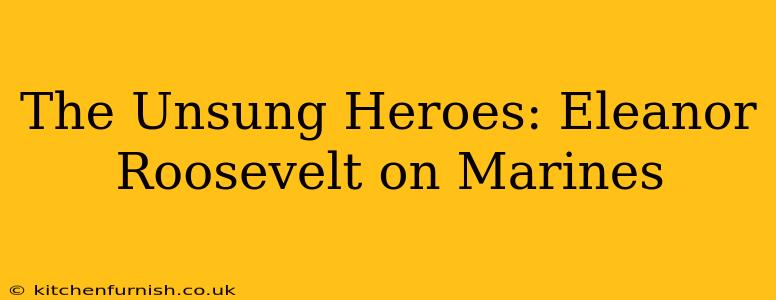Eleanor Roosevelt, a woman synonymous with grace, strength, and unwavering dedication to social justice, held a unique perspective on the United States Marine Corps. While not directly involved in military operations, her deep empathy for service members, coupled with her extensive travels and interactions with people from all walks of life, provided her with a nuanced understanding of the Marines' role and the sacrifices they made. This understanding, often expressed through her writings and speeches, reveals a fascinating glimpse into her views on these "unsung heroes," as she might have called them. This article delves into Eleanor Roosevelt's perspective on the Marines, exploring her understanding of their service, her admiration for their dedication, and the impact her views had on shaping public perception.
What did Eleanor Roosevelt think of the Marines?
Eleanor Roosevelt's opinion of the Marines was one of profound respect, admiration, and a keen awareness of the unique challenges they faced. Her perspective wasn't based on superficial observation but rather stemmed from a deep-seated understanding of their dedication to duty, their courage in the face of adversity, and the sacrifices they made for their country. She recognized the Marines' distinct ethos, their unwavering commitment to their fellow Marines, and their often unseen contributions to global peace and security. While she didn't publicly endorse or critique specific military strategies, her writings and speeches consistently highlighted the human cost of war and the bravery of those who served, including Marines.
Did Eleanor Roosevelt ever visit Marines?
While detailed records of every one of Eleanor Roosevelt's visits may be difficult to completely compile, it's highly probable that she interacted with Marines during her extensive travels, both domestically and internationally. Her commitment to visiting troops overseas and her involvement in various military support organizations suggests frequent contact with members of all branches of the military, including the Marines. Though specific accounts might be scarce, her overall engagement with the military strongly implies personal encounters with Marines.
How did Eleanor Roosevelt support the Marines?
Eleanor Roosevelt's support for the Marines wasn't necessarily expressed through direct, overt actions like fundraising campaigns solely dedicated to the Corps. Her support manifested through broader efforts aimed at supporting all service members and their families. Her unwavering advocacy for veterans' rights, her commitment to improving the lives of military families, and her tireless work promoting social justice and equality all indirectly but significantly benefitted Marines. Her outspokenness against discrimination and her tireless efforts to improve the lives of underprivileged Americans touched many, including the families of Marines. This indirect support is arguably as impactful, if not more so, than direct, targeted interventions.
What role did Eleanor Roosevelt play in supporting veterans and their families?
Eleanor Roosevelt was a staunch advocate for veterans and their families, a role deeply intertwined with her broader commitment to social justice. She consistently championed policies and programs aimed at improving the lives of veterans, pushing for better access to healthcare, education, and employment opportunities. Her understanding of the challenges faced by veterans, both physical and emotional, fueled her commitment to ensuring they received the support they deserved upon returning home. This work extended to supporting their families, acknowledging the significant sacrifices they too endured. Her efforts directly influenced legislation and public opinion, leaving a lasting legacy of support for those who served.
What is the lasting impact of Eleanor Roosevelt's views on the military?
Eleanor Roosevelt's perspective, while not directly focused solely on the Marines, had a far-reaching impact on shaping public perception of the military and its members. Her advocacy for veterans and her empathetic understanding of the sacrifices they made contributed to a more compassionate and nuanced public discourse surrounding military service. Her work highlighted the human element of warfare, fostering a deeper appreciation for the individuals who serve their country, regardless of branch. This enduring legacy ensures that the sacrifices of Marines, and all service members, are remembered and honored, fostering a culture of gratitude and respect. Her words and actions served as a powerful reminder of the human cost of conflict and the importance of supporting those who bravely serve.

